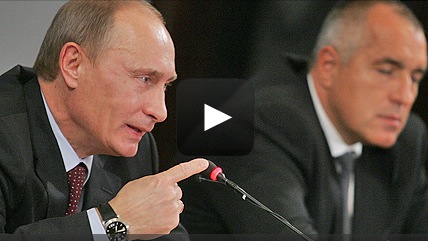Shortly before Christmas, the abbot of the Vatopedi monastery, an eleventh century foundation on Mount Athos, was arrested on suspicion of inciting fraud. He is accused of being involved in a dubious real estate transaction, which resulted in a profit of 100 million Euros.
The details of this case, including the abbot's involvement, have been in the public domain for years. A high ranking Russian Orthodox church official linked the decision to arrest Abbot Ephraim at this time to Ephraim's recent visit to Russia, where he presented a precious relic to worshippers, the belt of the Holy Mother of God, and met Vladimir Putin twice.
According to a US embassy cable, the Vatopedi scandal is not an isolated case. Moreover, the cable says that the Greek government and Vatopedi colluded in their efforts to "limit damage". 08THESSALONIKI81 states (emphasis by the editor):
"The GoG and Vatopedi have tried to limit damage by proposing measures to reverse the transactions. ... The Church has sought to portray the scandal as isolated to Vatopedi but is concerned the fallout could affect other monasteries and patriarchates with similar ancient land holdings."
...
"The extent of the scandal is still unknown. It is likely to remain an embarrassment to the government for some time and could claim more political victims as Vatopedi, the GoG, and the courts attempt to unwind the numerous illicit land deals and the parliamentary investigation gets underway."
A recent real estate scandal brought Mt. Athos, or Holy Mountain, an autonomous part of Greece, and one of the last theocratic states, back into the spotlight of the main stream media. Yet, the validity of Ottoman land titles and the political connections of the 20 monasteries that include visits from Prince Charles and Vladimir Putin, are not the only controversies associated with the Byzantine community.
As it is often pointed out briefly in wire reports and newspaper articles discussing the World Heritage site, women, and most female animals have been barred from entering the peninsula for over 1000 years. Men may apply for a visa, at a fee of 25 Euros. Yet, this restriction does not only affect visitors wishing to visit the monasteries for spiritual recreation.
In effect, it bars women from conducting research on the monasteries themselves and the artifacts they hold, for instance Byzantine icons and vast library collections. At present, these items are only accessible on photographs, which may or may not be provided, in varying quality. A first hand inspection of the artifact, which would be required for scholarly publications, is per se not possible. There are no mechanisms in place that would grant access to the originals for all researchers in a pragmatic manner while preserving the rules of the monasteries, e.g. by temporary transfer to the mainland.
This policy is in clear violation of a 2003 EU parliament resolution on "basic rights":
"The European Parliament,...
Boyko Borisov complained about Putin to the Americans; RWE had been “sabotaged” to give up on Belene NPP project.

Bulgarians "risk being cold" this winter if the government did not move forward with the Russian energy projects. This is what Russian Prime Minister, Vladimir Putin said, off-the-record, to his Bulgarian counterpart, Boyko Borisov, during the summit in Gdansk in September, 2009. The tone of the sentence in question is not clear, we cannot judge if it was threatening enough, but obviously it seriously impressed Borisov in order for him to report it in a timely manner and for Putin’s words to find their place in the classified documents of the American diplomacy.
Borisov’s complaint about Putin’s attitude is described in a US diplomatic cable, dated October 5, 2009, released by Wikileaks [09SOFIA561]. The text does not elucidate if this has been a joke or a threat. On September 29, 2009, Borisov had asked the US government for assistance in the diversification of energy sources for Bulgaria.
“The cash-strapped new administration seeks not only to rid itself of projects of questionable commercial viability but also to increase its energy security through diversification,” the American diplomats believe.
The cable talks about the meeting between the Prime Minister and three large US energy companies, held on that same date. As a result, the government had made the commitment to engage in negotiations to use US technology to diversify its nuclear fuel supply and create a spent nuclear fuel storage facility.
Theme by Danetsoft and Danang Probo Sayekti inspired by Maksimer